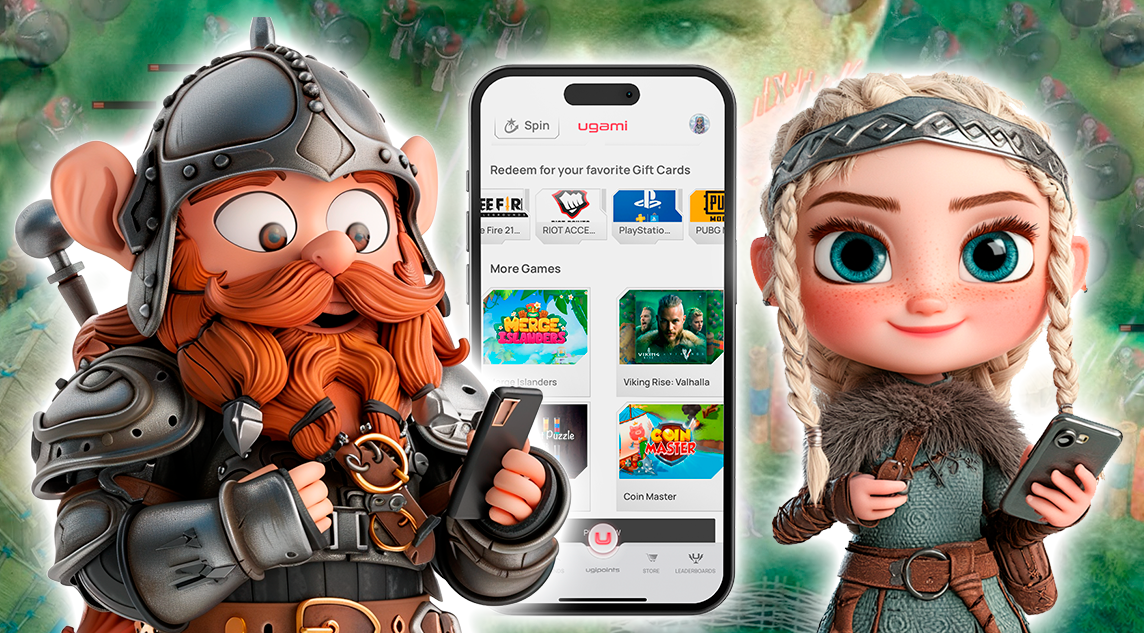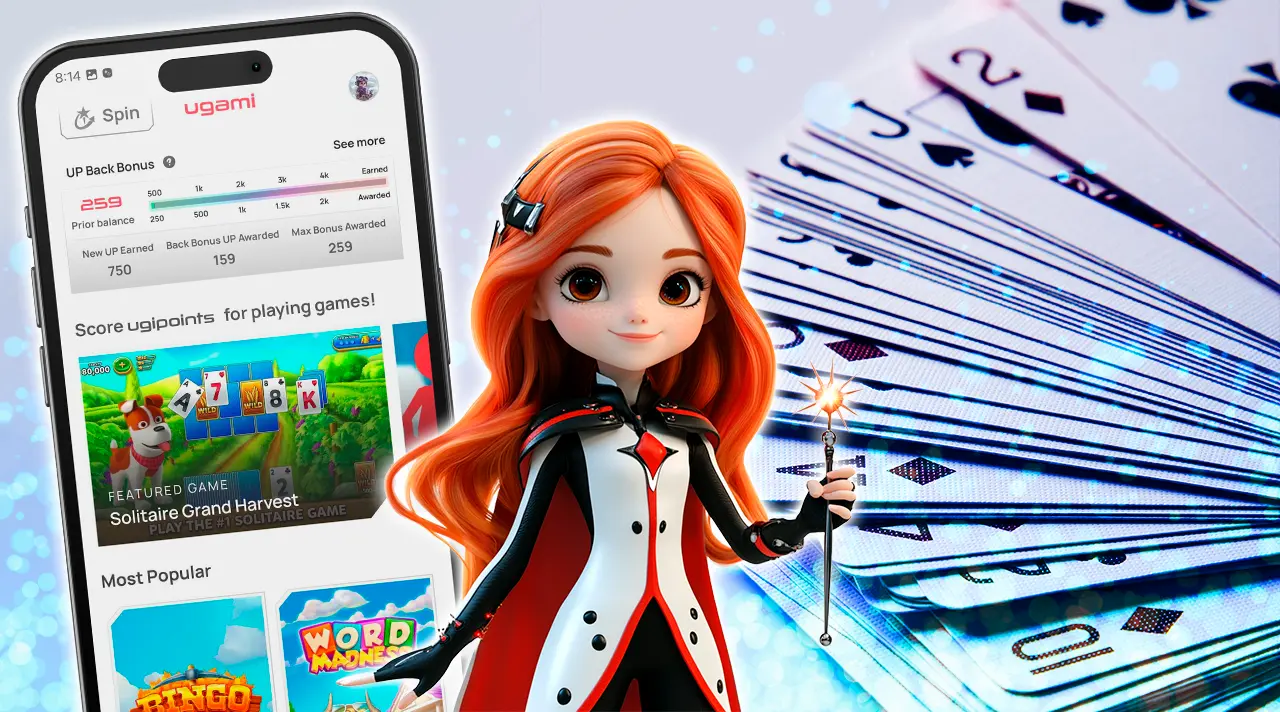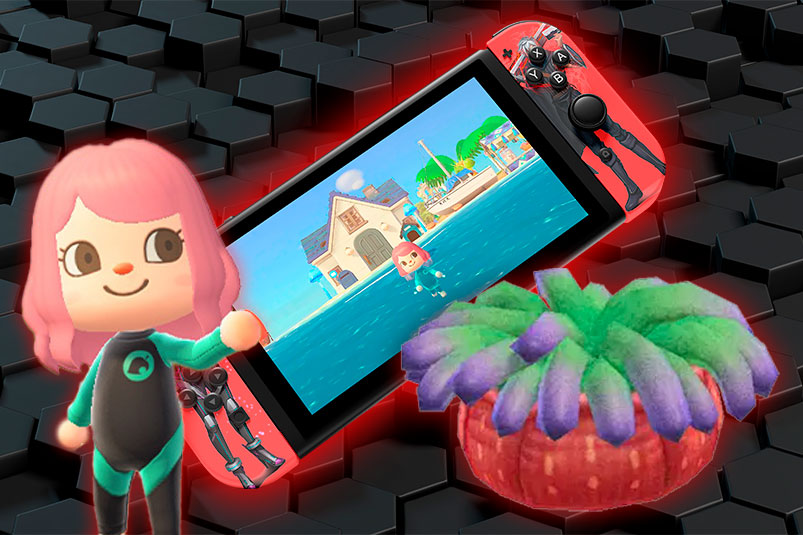
Share this content!
Share this content!
Table of contents
- What do you need to get Sea Creatures in Animal Crossing New Horizons?
- Find and Catch the Animal Crossing Sea Creatures
- What to do with the Animal Crossing New Horizons Sea Creatures?
- How many sea creatures are in Animal Crossing?
- How and when catching Animal Crossing sea creatures?
- Seaweed
- Sea grapes
- Sea cucumber
- Sea pig
- Sea star
- Sea urchin
- Slate pencil urchin
- Sea anemone
- Moon jellyfish
- Sea slug
- Pearl oyster
- Mussel
- Oyster
- Scallop
- Whelk
- Turban shell
- Abalone
- Gigas giant clam
- Chambered nautilus
- Octopus
- Umbrella octopus
- Vampire squid
- Firefly squid
- Gazami crab
- Dungeness crab
- Snow crab
- Red king crab
- Acorn barnacle
- Spider crab
- Tiger prawn
- Sweet shrimp
- Mantis shrimp
- Spiny Lobster
- Lobster
- Giant isopod
- Horseshoe crab
- Sea pineapple
- Spotted garden eel
- Flatworm
- Venus’ flower basket
- Which are the rarest sea creatures in Animal Crossing ?
- A watery world awaits for you with Animal Crossing Sea Creatures
Animal Crossing: New Horizons is a splash of fun and a relaxing experience! We enjoy every activity within the game, including collecting Animal Crossing sea creatures, bugs, and fish.
The latest 2021 update introduced a whole new underwater world, teeming with fascinating sea creatures to discover. So, if you want to collect them, grab your wet suit, and let’s explore the depths together.
The once serene ocean surrounding your island is now a bustling ecosystem. With the Animal Crossing sea creatures update, players can explore and collect an array of marine life.
Other articles that you will like:
- Animal Crossing Bugs Guide: Discover, Catch, and Collect
- Get creative with these Animal Crossing: New Horizons island ideas to inspire you
- All you need to know about Animal Crossing: New Horizons
- The Role of NFTs in Play2Earn Games
What do you need to get Sea Creatures in Animal Crossing New Horizons?
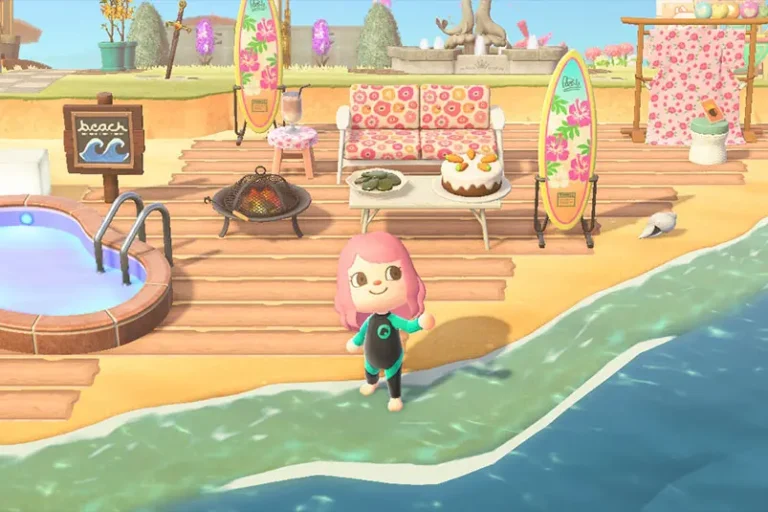
Before embarking on your aquatic adventure, make sure to grab a wet suit. It might seem like a clothing item, but it is not. So, head to Nook’s Cranny or the Nook Stop in Resident Services to pick one up. Also, you can buy them at the Nook Terminal.
Once equipped, you’re ready to plunge into the deep blue because you cannot swim without it.
To start your underwater exploration, stand at the water’s edge and press ‘A’ to hop into the sea. While swimming, look out for bubbles rising to the surface, indicating a sea creature’s presence. Swim towards the bubbles and press ‘Y’ to dive deeper.
Find and Catch the Animal Crossing Sea Creatures
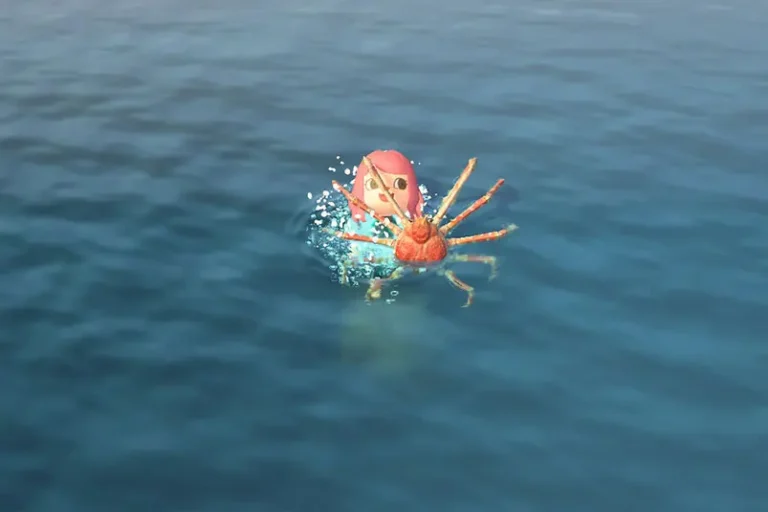
As you explore around in Animal Crossing: New Horizons, you’ll come across various sea creatures, each with its own distinct shape. Some are common, while others are rare finds.
We have a tip for you: keep an eye out for shadow sizes – larger shadows often mean more valuable discoveries.
So, once you’ve spotted a sea creature, swim close and press ‘A’ to capture it. Your character will then grab the creature, adding it to your collection. Check out the Critterpedia to keep track of the sea creatures you’ve caught.
What to do with the Animal Crossing New Horizons Sea Creatures?
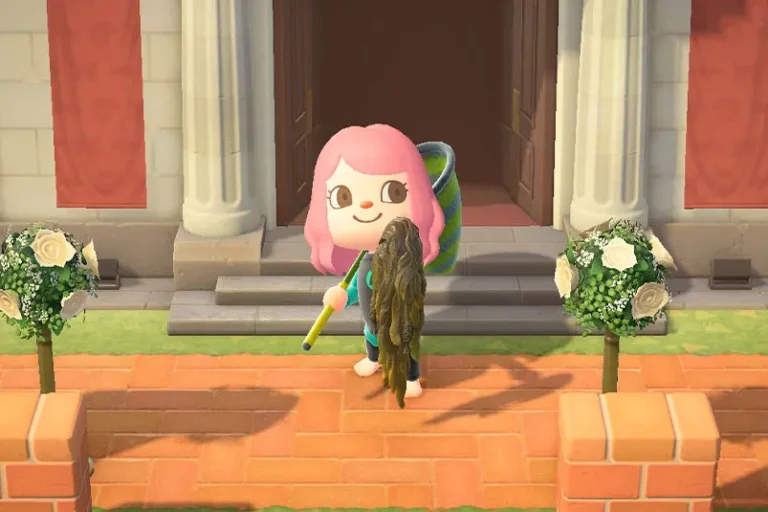
You can decide what to do with your underwater treasures. Of course, if you just found a new creature, you must donate it to the museum to upgrade your collection. But if you already have that creature, we recommend you sell it for a tidy profit at Nook’s Cranny or use it as a stunning decoration in your home.
Sea creatures can be traded for Bells at Nook’s Cranny, proving to be quite lucrative. Their selling value begins at 500 Bells (for example, sea anemone or sea star) and can reach as high as 15,000 Bells (gigas giant clam).
How many sea creatures are in Animal Crossing?
There are 40 sea creatures to discover and capture in Animal Crossing: New Horizons. These include cute sea stars, seaweed, and jellyfish. Each one presents a unique challenge and a chance to expand your Critterpedia.
How and when catching Animal Crossing sea creatures?
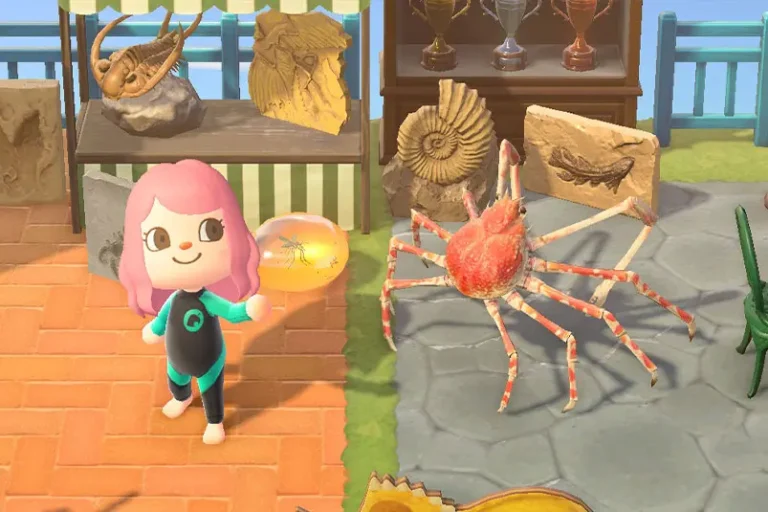
Keep in mind that the availability of Animal Crossing sea creatures changes with the seasons. Some may only appear during specific months or times of the day, so plan your dives accordingly.
Remember, you need to keep an eye on the bubbles in the sea and get closer before diving deeper and catching them.
Seaweed
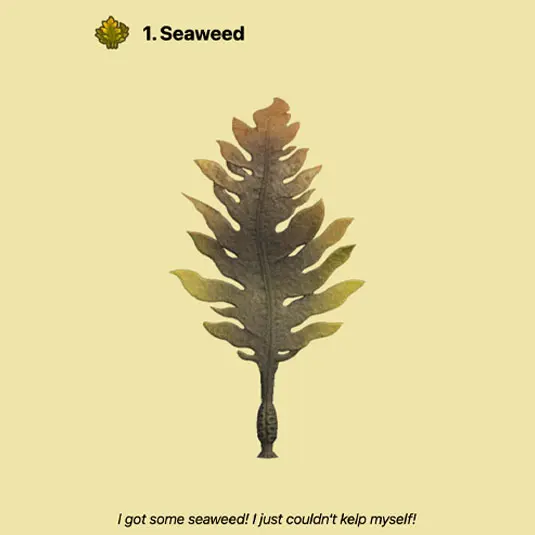
When to find it: All day. For the northern hemisphere islands from October to July. For the southern hemisphere islands, from April to January.
Value: 600 bells
Sea grapes
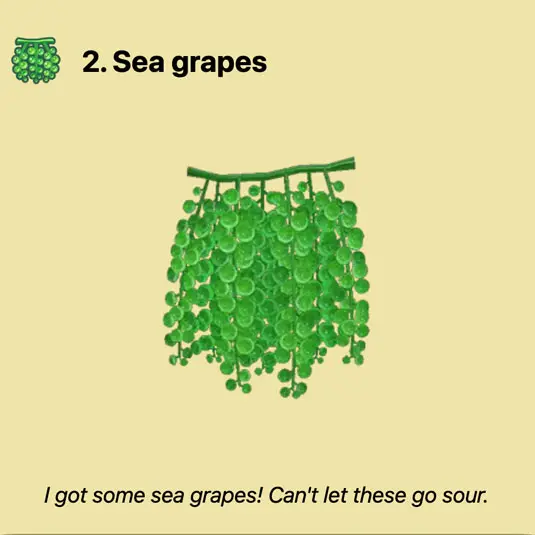
When to find it: You can find these Animal Crossing Sea Creatures All day. For the northern hemisphere islands from June to September. For the southern hemisphere islands, from December to March.
Value: 900 bells
Sea cucumber
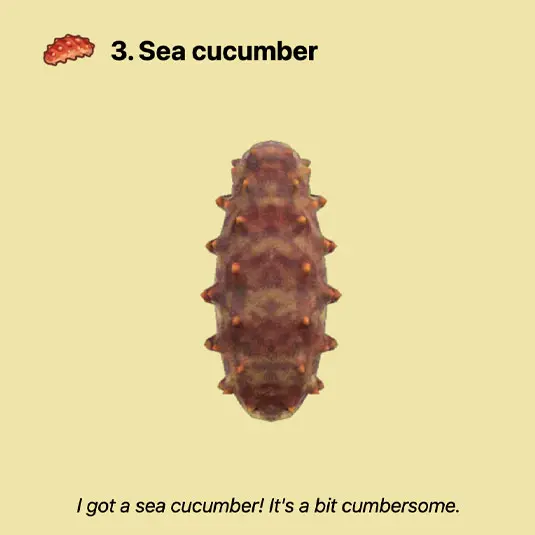
When to find it: All day. For the northern hemisphere islands from November to April. For the southern hemisphere islands, from May to October.
Value: 500 bells
Sea pig
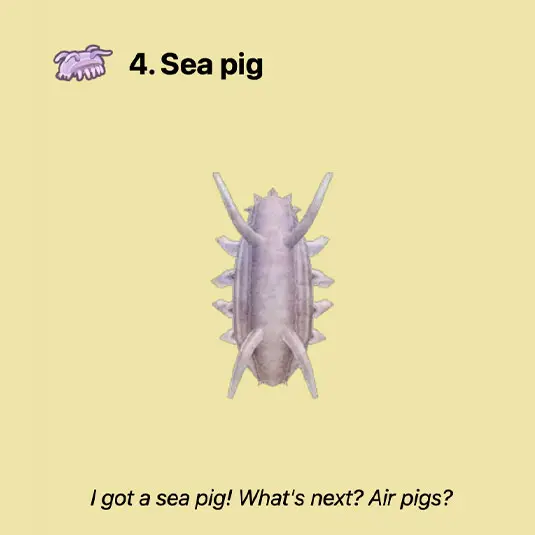
When to find it: Find these Animal Crossing Sea Creatures from 4 p.m. to 9 a.m. For the northern hemisphere islands from November to February. For the southern hemisphere islands, from May to August.
Value: 10,000 bells
Sea star
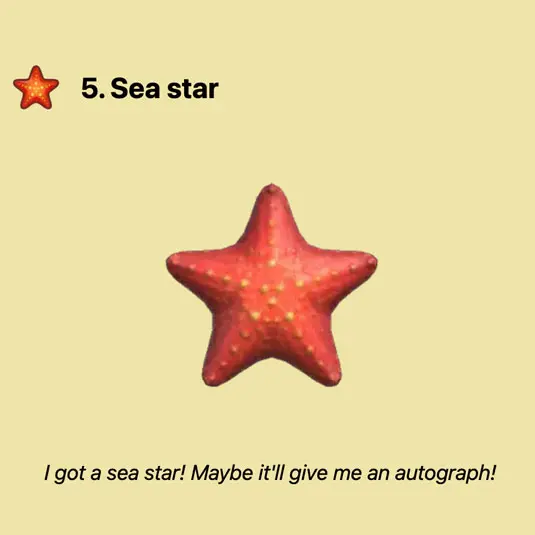
When to find it: All day. All year.
Value: 500 bells
Sea urchin
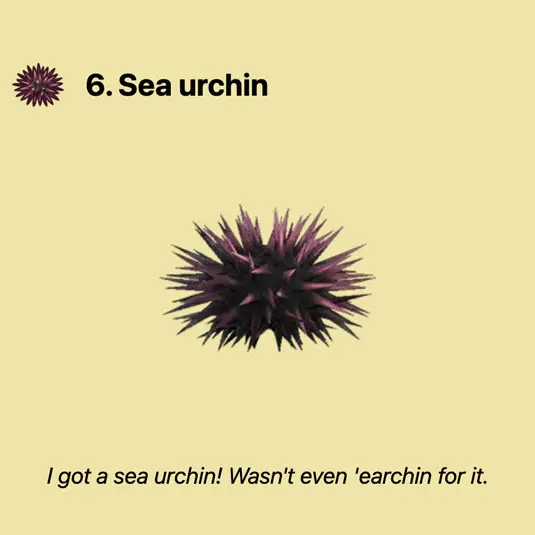
When to find it: All day. For the northern hemisphere islands from May to September. For the southern hemisphere islands, from November to March.
Value: 1,700 bells
Slate pencil urchin

When to find it: From 4 p.m. to 9 a.m. For the northern hemisphere islands from May to September. For the southern hemisphere islands, from November to March.
Value: 2,000 bells
Sea anemone
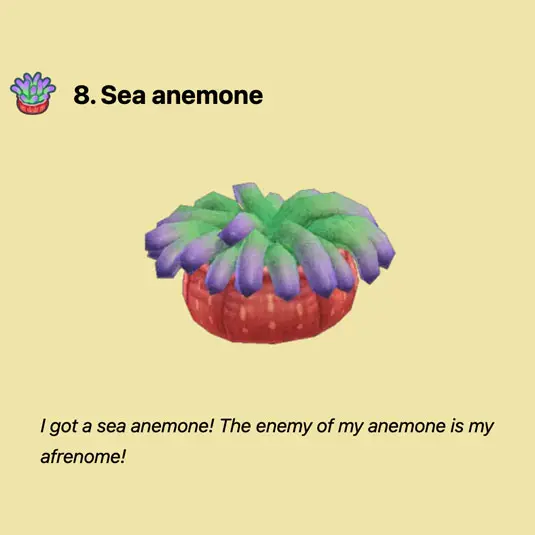
When to find it: All day. All year.
Value: 500 bells
Moon jellyfish
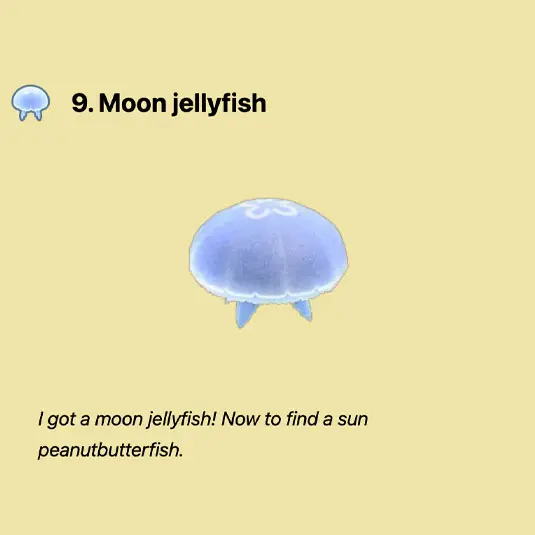
When to find it: You can find these Animal Crossing Sea Creatures all day. For the northern hemisphere islands from July to September. For the southern hemisphere islands, from January to March.
Value: 600 bells
Sea slug
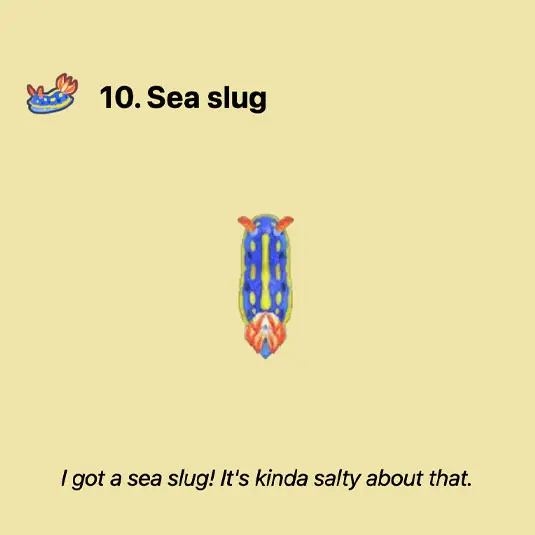
When to find it: All day. All year.
Value: 600 bells
Pearl oyster
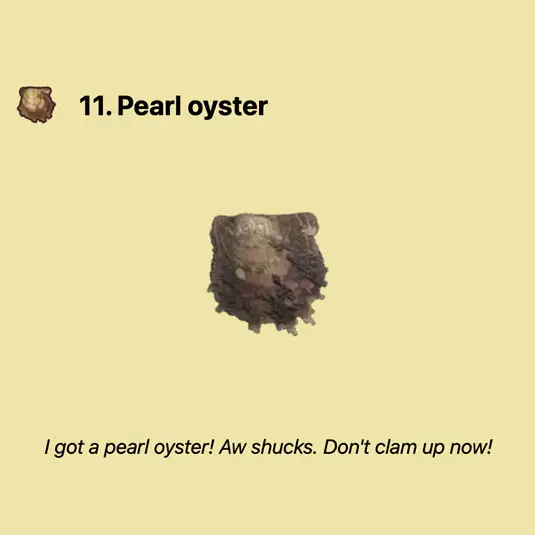
When to find it: All day. All year.
Value: 2,800 bells
Mussel
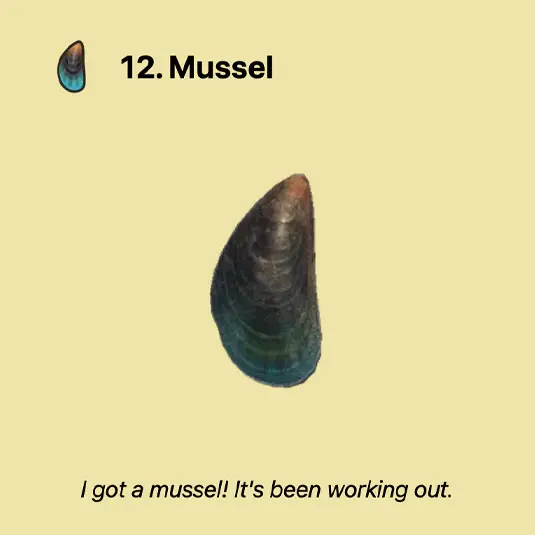
When to find it: All day. For the northern hemisphere islands from June to December. For the southern hemisphere islands, from December to June.
Value: 1,500 bells
Oyster
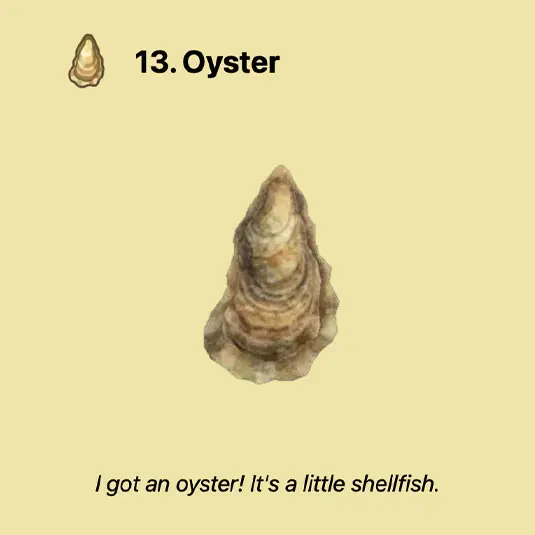
When to find it: All day. For the northern hemisphere islands from September to February. For the southern hemisphere islands, from March to August.
Value: 1,100 bells
Scallop
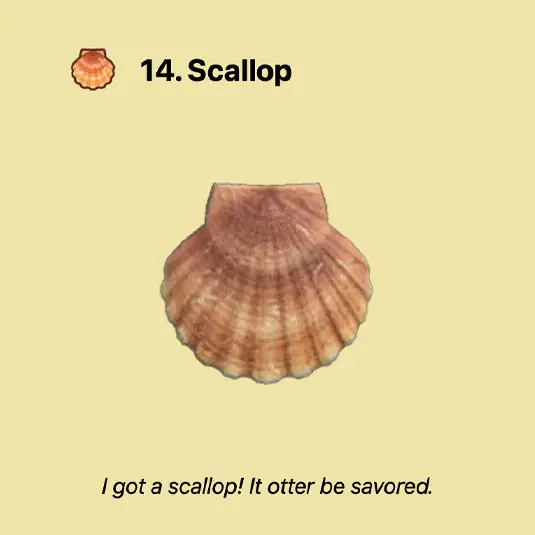
When to find it: All day. All year.
Value: 1,200 bells
Whelk
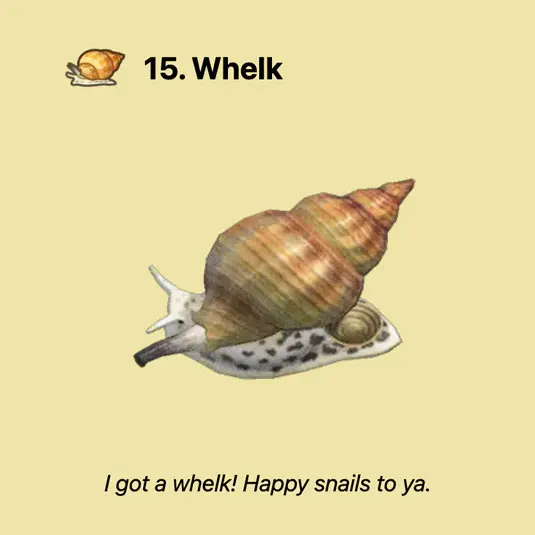
When to find it: All day. All year.
Value: 1,000 bells
Turban shell
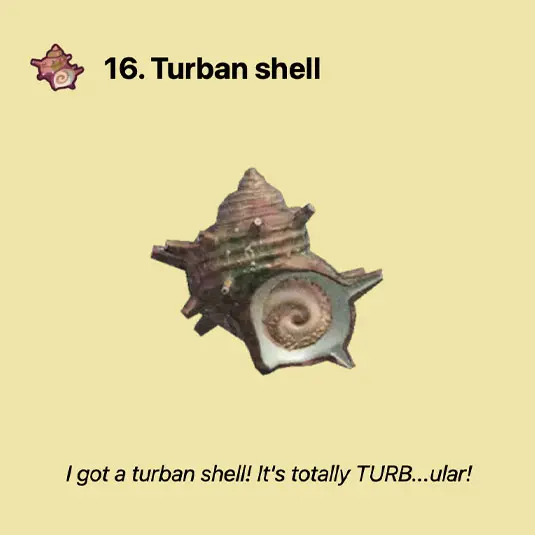
When to find it: All day. For the northern hemisphere islands, from March to May and from September to December. For the southern hemisphere islands, from March to June and from September to November.
Value: 1,000 bells
Abalone
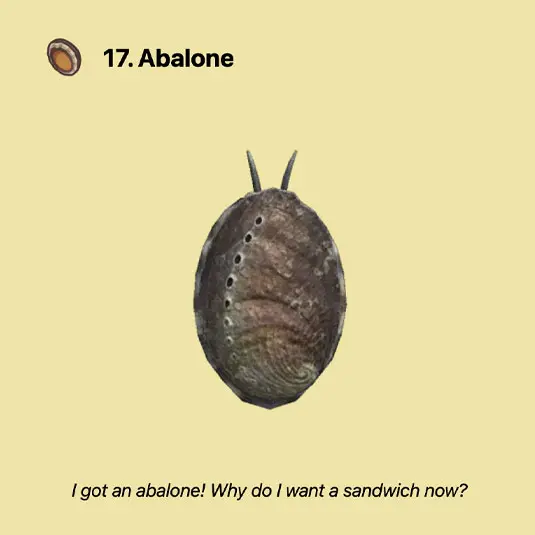
When to find it: From 4 p.m. to 9 a.m. For the northern hemisphere islands from June to January. For the southern hemisphere islands, from December to July.
Value: 2,000 bells
Gigas giant clam
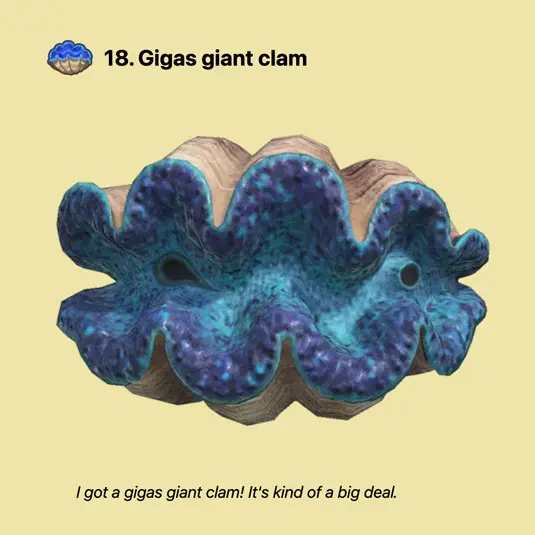
When to find it: All day. For the northern hemisphere islands from May to September. For the southern hemisphere islands, from November to March.
Value: 15,000 bells
Chambered nautilus
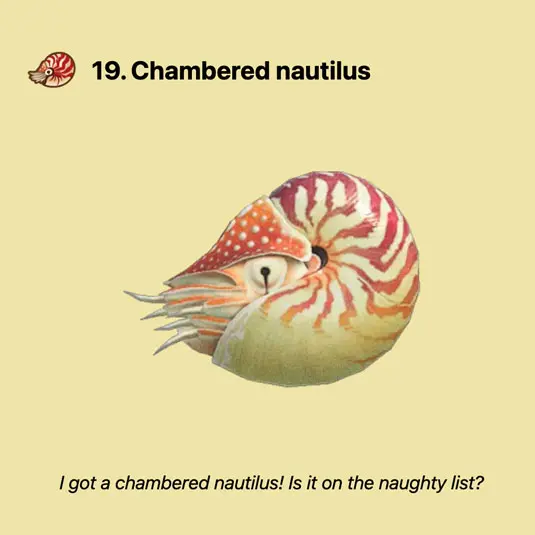
When to find it: From 4 p.m. to 9 a.m. For the northern hemisphere islands, from March to June and from September to December. For the southern hemisphere islands, from September to November and from March to May.
Value: 1,800 bells
Octopus
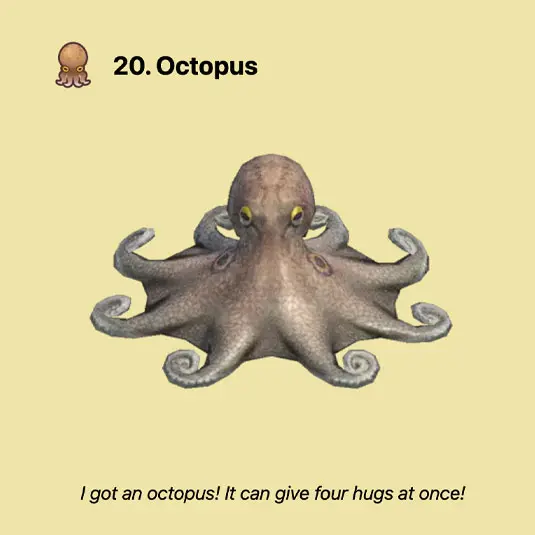
When to find it: All day. All year.
Value: 1,200 bells
Umbrella octopus
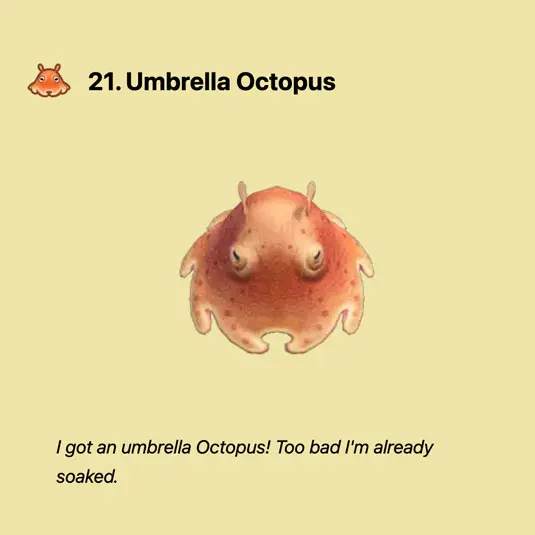
When to find it: All day. For both hemispheres from March to May and from September to November.
Value: 6,000 bells
Vampire squid
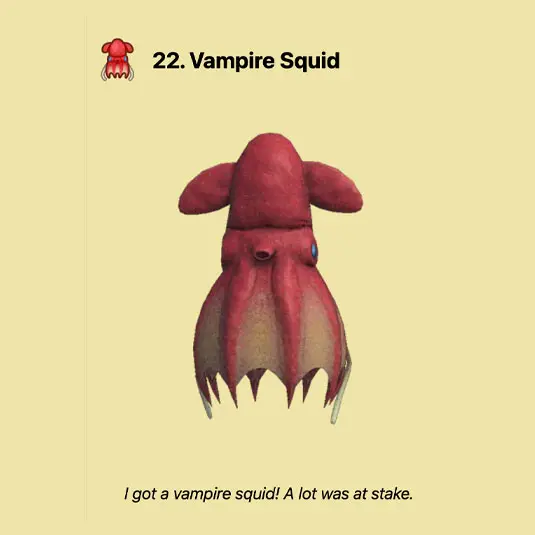
When to find it: From 4 p.m. to 9 a.m. For the northern hemisphere islands from May to August. For the southern hemisphere islands, from November to February.
Value: 10,000 bells
Firefly squid
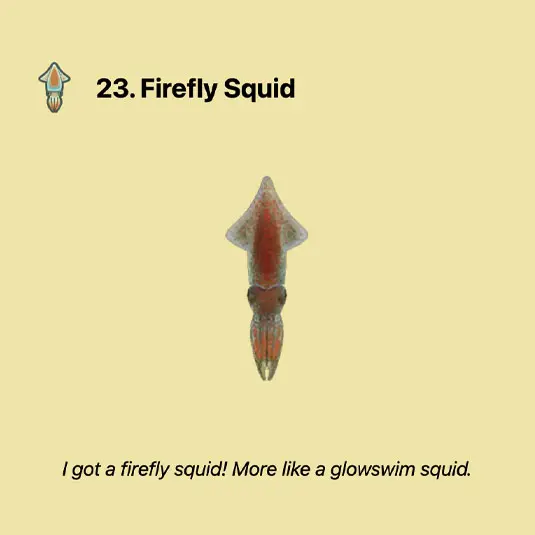
When to find it: From 4 p.m. to 9 a.m. For the northern hemisphere islands from March to June. For the southern hemisphere islands, from September to December.
Value: 1,400 bells
Gazami crab
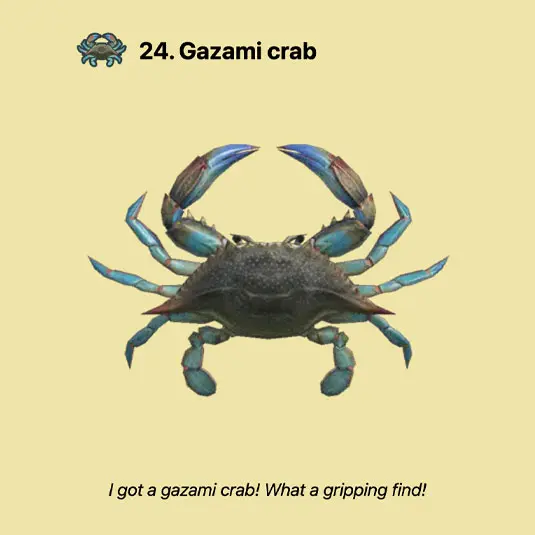
When to find it: From 4 p.m. to 9 a.m. For the northern hemisphere islands from June to November. For the southern hemisphere islands, from December to May.
Value: 2,200 bells
Dungeness crab
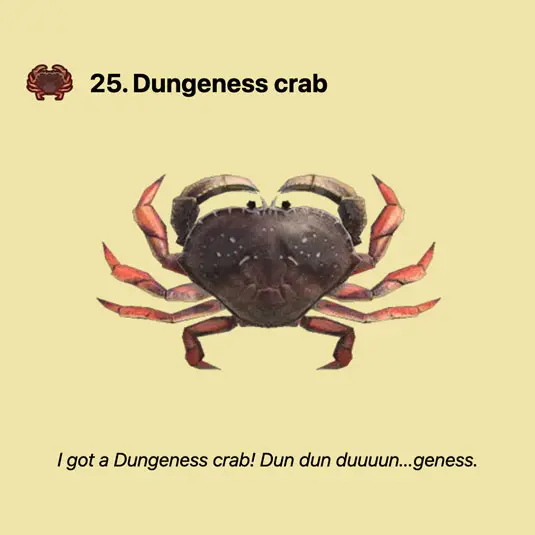
When to find it: All day. For the northern hemisphere islands from November to May. For the southern hemisphere islands, from May to November.
Value: 1,900 bells
Snow crab
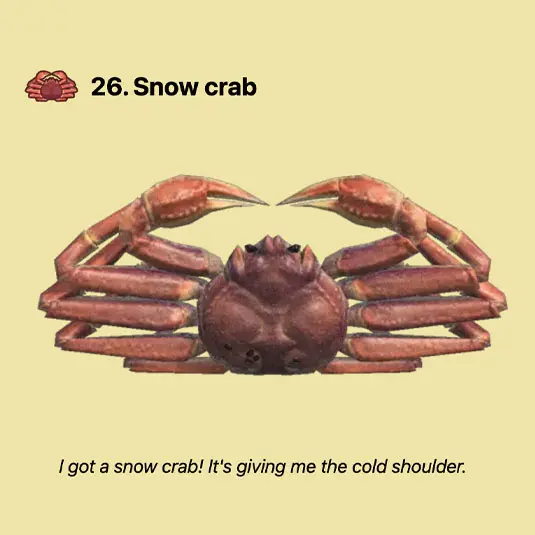
When to find it: All day. For the northern hemisphere islands from November to April. For the southern hemisphere islands, from May to October.
Value: 6,000 bells
Red king crab
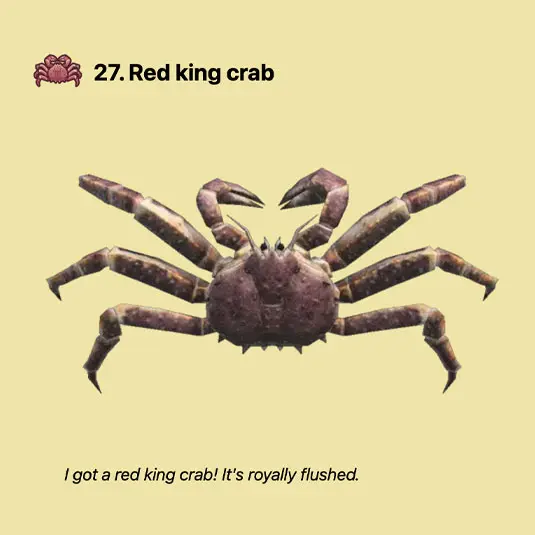
When to find it: All day. For the northern hemisphere islands from November to March. For the southern hemisphere islands, from May to September.
Value: 8,000 bells
Acorn barnacle
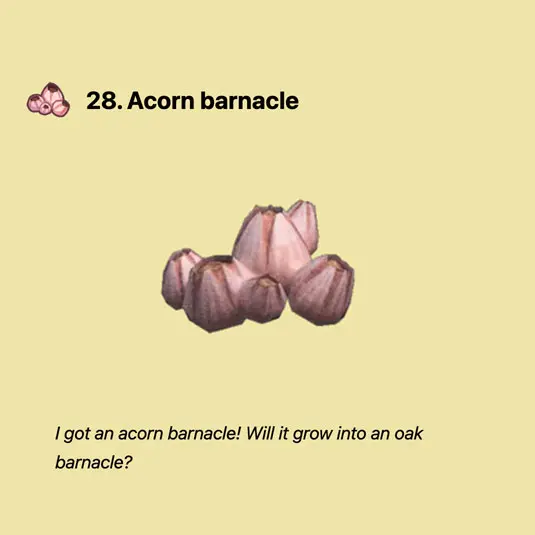
When to find it: These Animal Crossing Sea Creatures are available to catch All day. All year.
Value: 600 bells
Spider crab
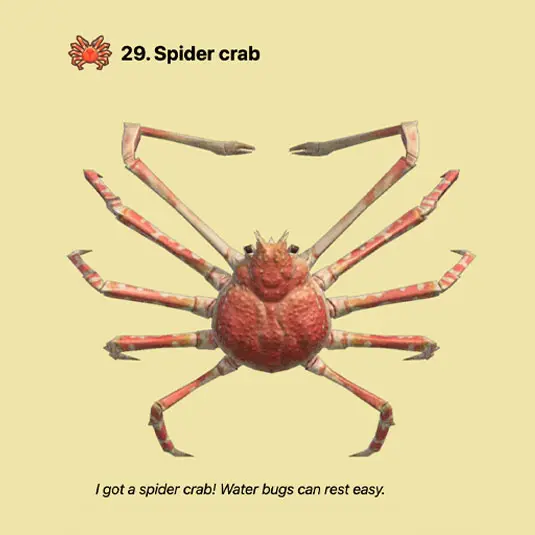
When to find it: All day. For the northern hemisphere islands from March to April. For the southern hemisphere islands, from September to October.
Value: 12,000 bells
Tiger prawn
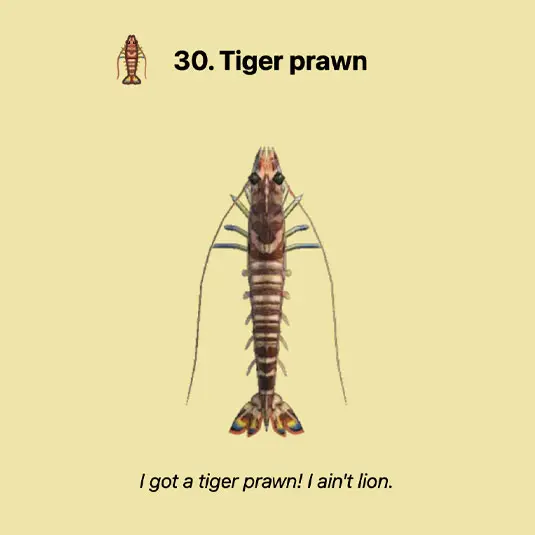
When to find it: From 4 p.m. to 9 a.m. For the northern hemisphere islands from June to September. For the southern hemisphere islands, from December to March.
Value: 3,000 bells
Sweet shrimp
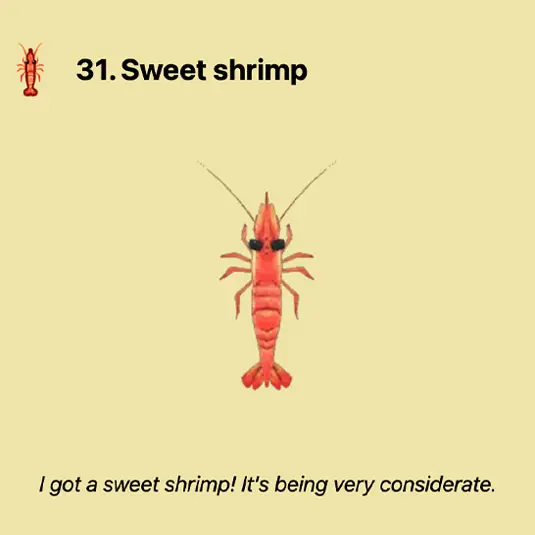
When to find it: From 4 p.m. to 9 a.m. For the northern hemisphere islands from September to February. For the southern hemisphere islands, from March to August.
Value: 1,400 bells
Mantis shrimp
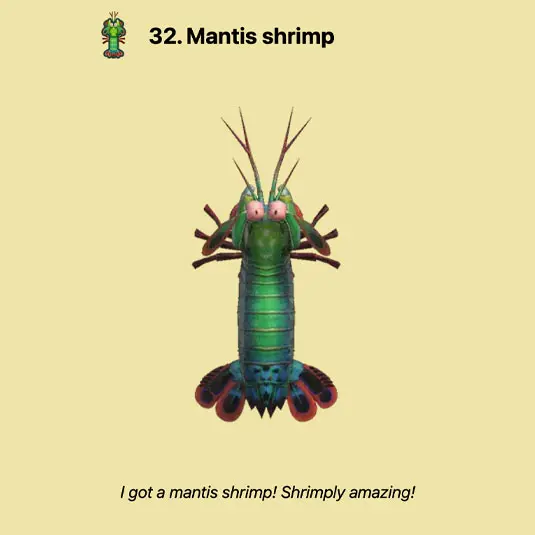
When to find it: From 4 p.m. to 9 a.m. All year round.
Value: 2,500 bells
Spiny Lobster
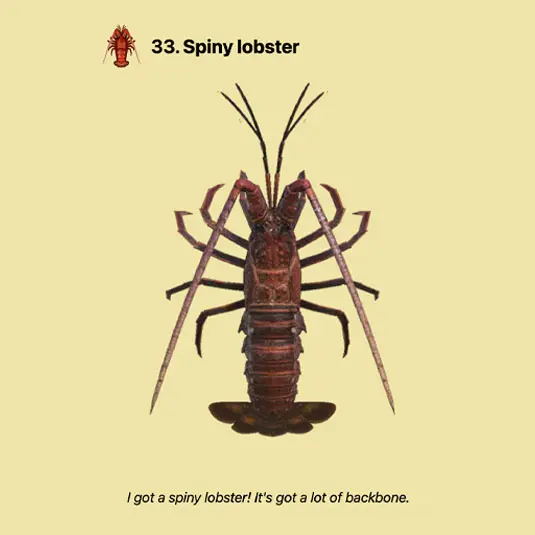
When to find it: From 9 p.m. to 4 a.m. For the northern hemisphere islands from October to December. For the southern hemisphere islands, from April to June.
Value: 5,000 bells
Lobster
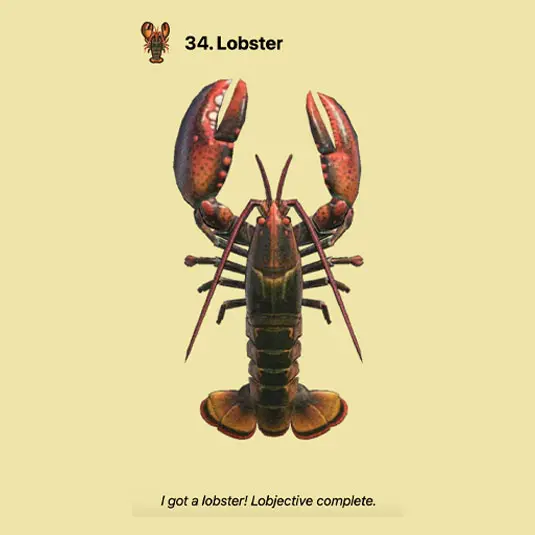
When to find it: From 9 p.m. to 4 a.m. For the northern hemisphere islands, it is from April to June and from December to January. For the southern hemisphere islands, from October to December and from June to July.
Value: 4,500 bells
Giant isopod
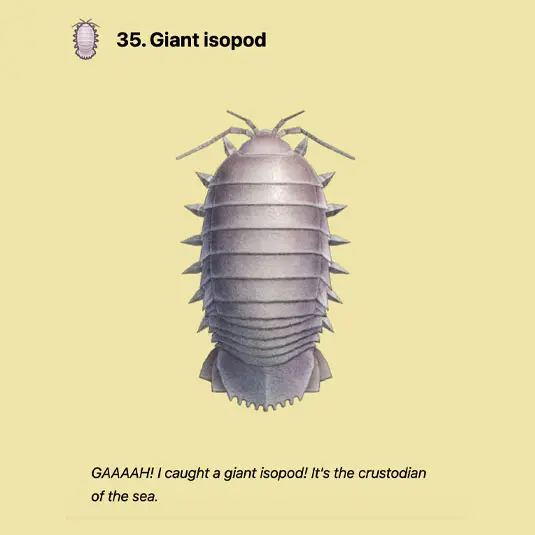
When to find it: From 9 a.m. to 4 p.m. and from 9 p.m. to 4 a.m. For the northern hemisphere islands from July to October. For the southern hemisphere islands, from January to April.
Value: 12,000 bells
Horseshoe crab
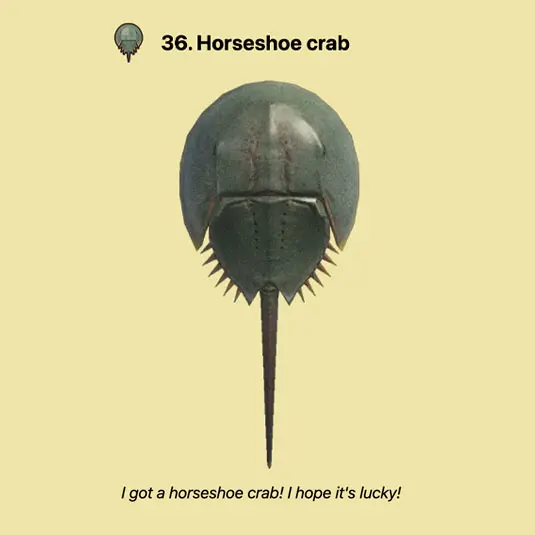
When to find it: From 9 p.m. to 4 a.m. For the northern hemisphere islands from July to September. For the southern hemisphere islands, from January to March.
Value: 2,500 bells
Sea pineapple
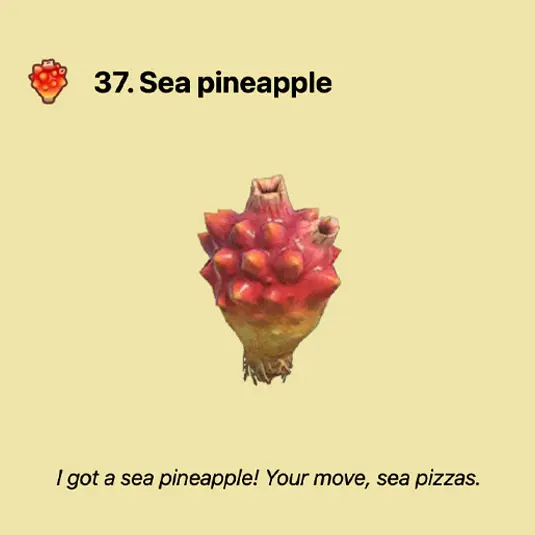
When to find it: All day. For the northern hemisphere islands from April to August. For the southern hemisphere islands, from December to July.
Value: 1,500 bells
Spotted garden eel
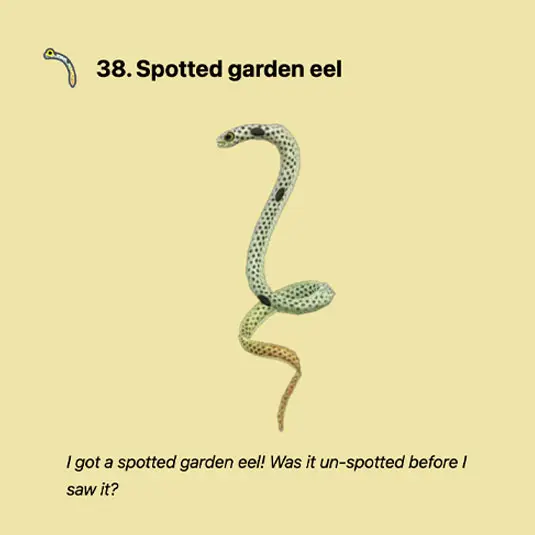
When to find it: From 4 a.m. to 9 p.m. For the northern hemisphere islands from May to October. For the southern hemisphere islands, from November to April.
Value: 1,100 bells
Flatworm
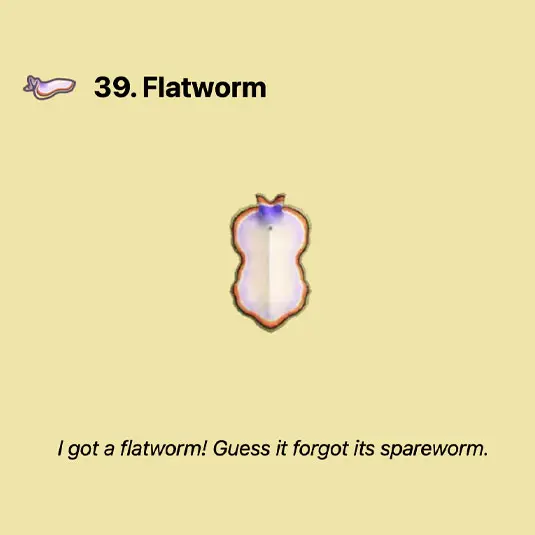
When to find it: From 9 p.m. to 4 a.m. For the northern hemisphere islands from August to September. For the southern hemisphere islands, from February to March.
Value: 700 bells
Venus’ flower basket
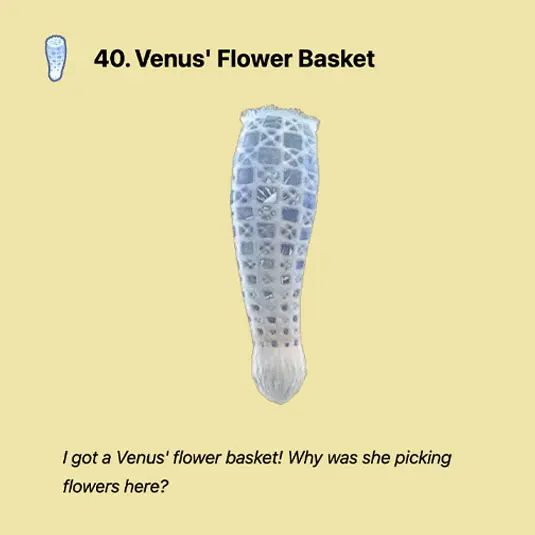
When to find it: All day. For the northern hemisphere islands from October to February. For the southern hemisphere islands, from April to August.
Value: 5,000 bells
Which are the rarest sea creatures in Animal Crossing?
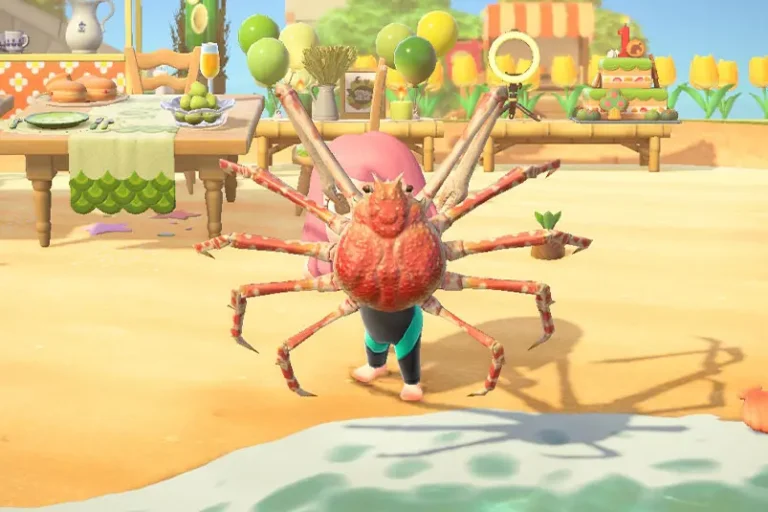
In Animal Crossing: New Horizons, some sea creatures are considered rarer than others, making them more challenging to find and profitable when sold.
The rarest Animal Crossing sea creatures are Gigas Giant Clams, Spider Crabs, Sea Pigs, Vampire Squid, Horseshoe Crabs, Spiny Lobsters, Red King Crabs, and Giant Isopods.
A watery world awaits for you with Animal Crossing Sea Creatures
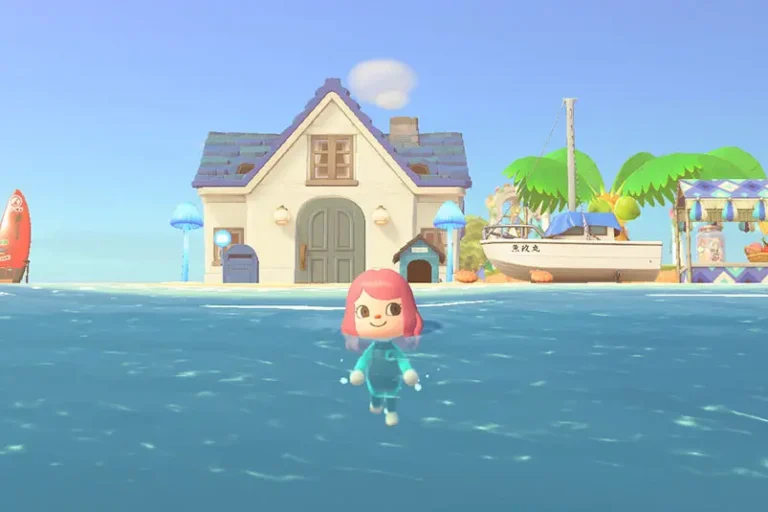
The sea creatures in Animal Crossing opened up a whole new dimension of fun for players. We encourage you to make your underwater adventure more enjoyable by inviting friends to play with you.
Yet, the adventure continues! Delve into our website for additional articles, tips, and tricks about this game. Don’t forget to stop by the Ugami Store to get Animal Crossing: New Horizons and a Nintendo gift card for the charming Happy Home Paradise DLC.


